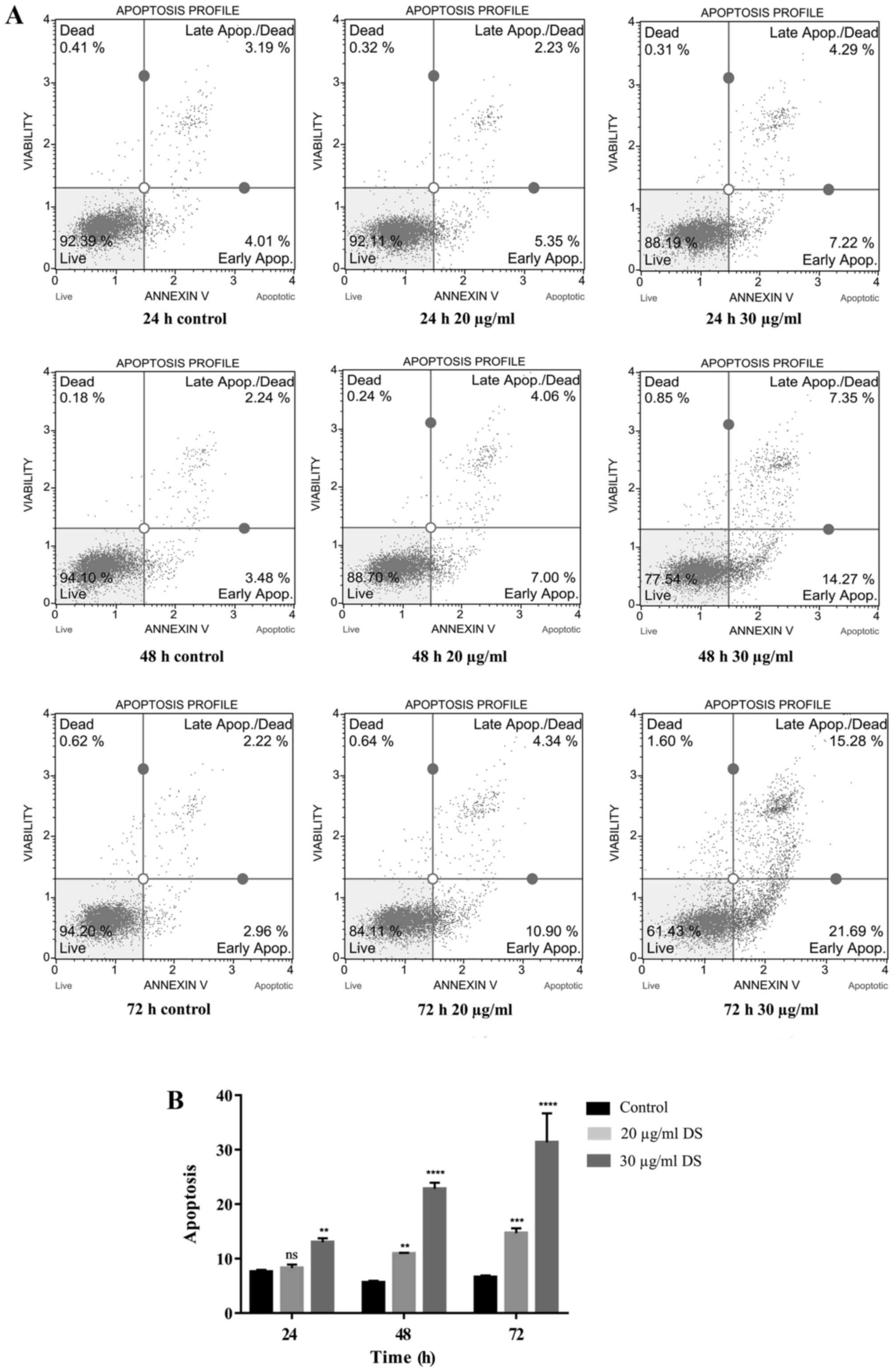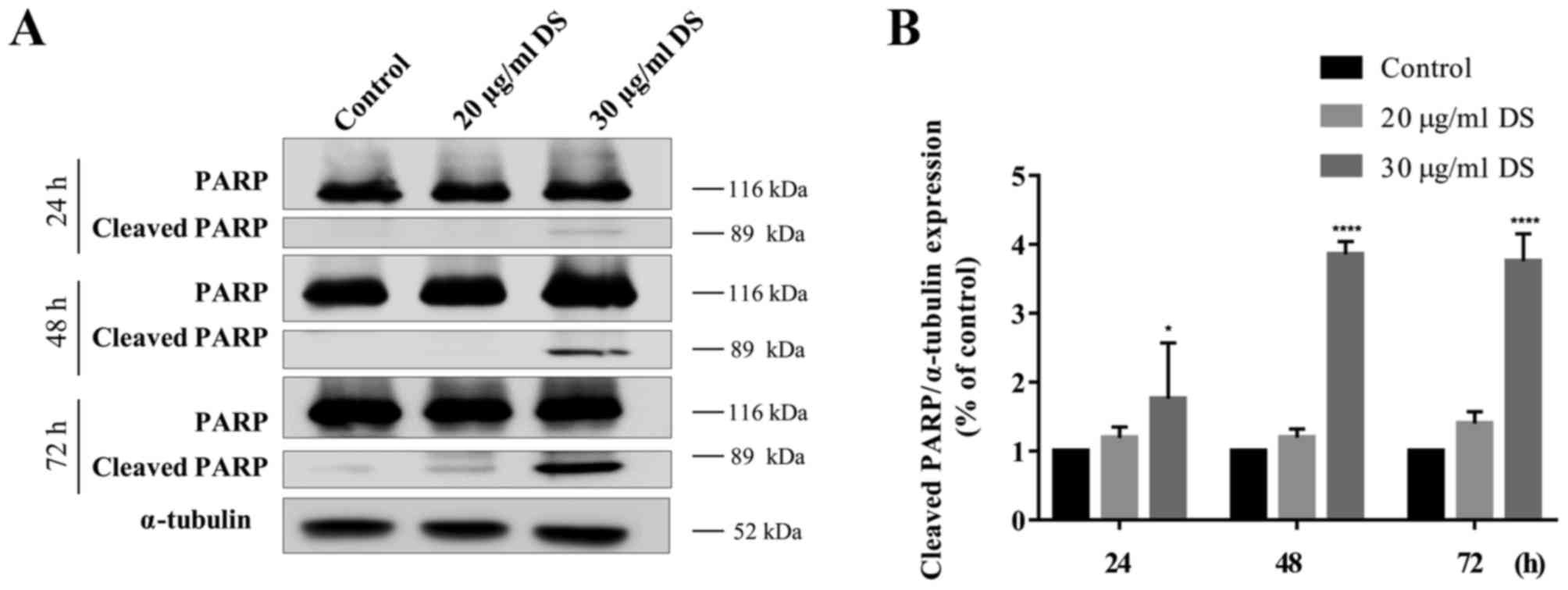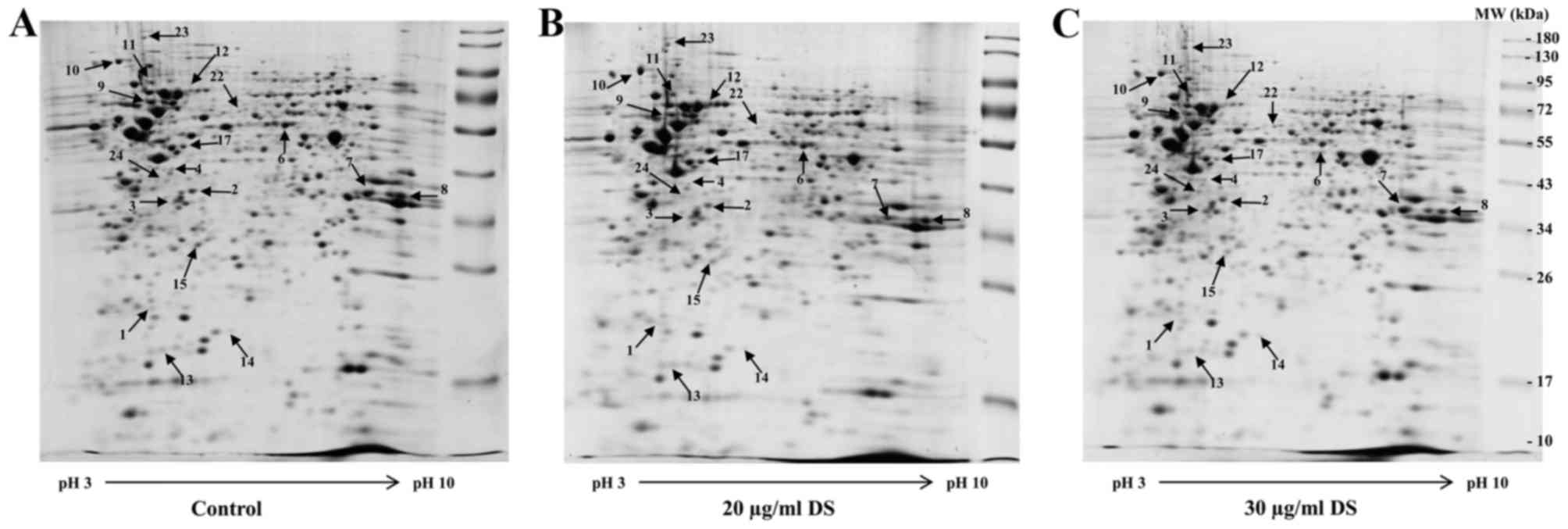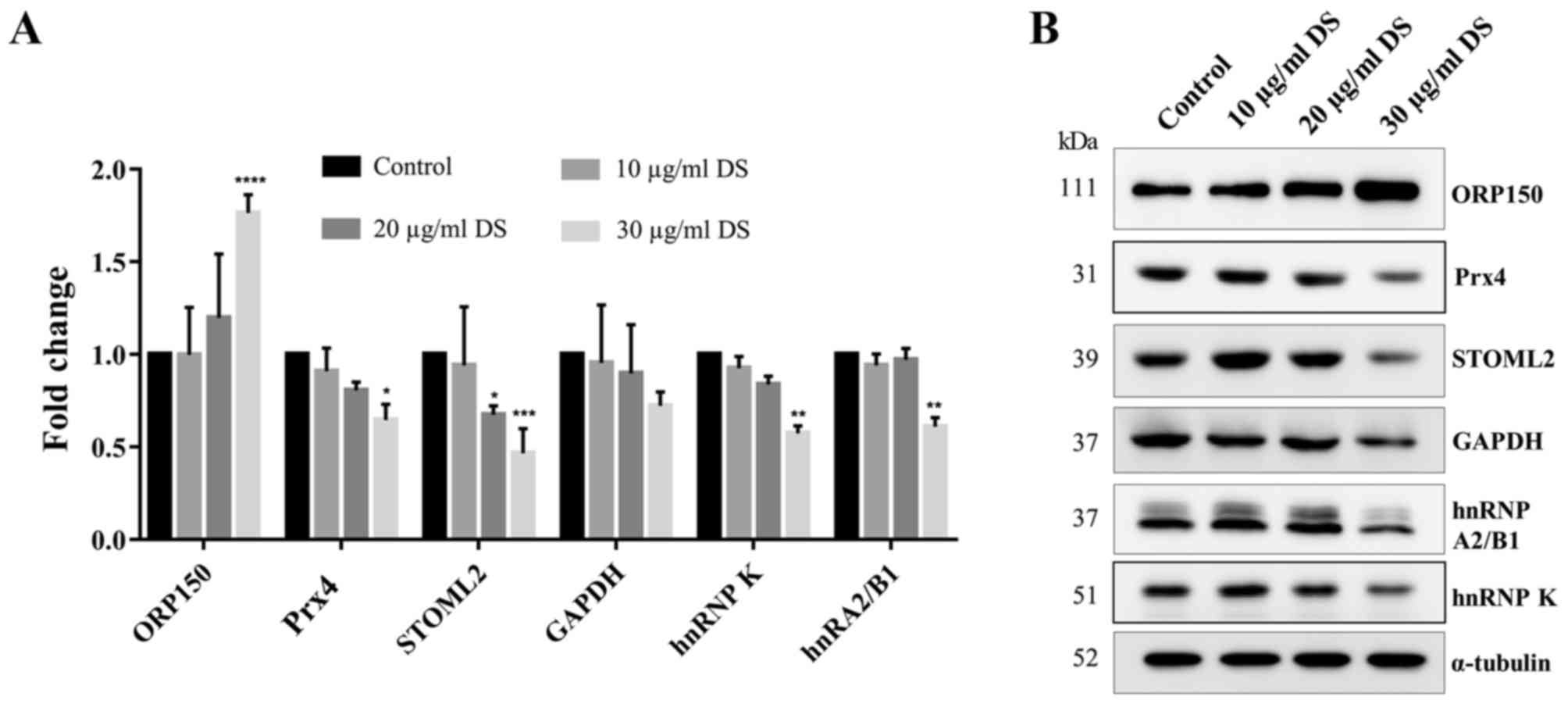|
1
|
Somboon K, Siramolpiwat S and Vilaichone
RK: Epidemiology and survival of hepatocellular carcinoma in the
central region of Thailand. Asian Pac J Cancer Prev. 15:3567–3570.
2014. View Article : Google Scholar : PubMed/NCBI
|
|
2
|
Mittal S and El-Serag HB: Epidemiology of
HCC: Consider the population. J Clin Gastroenterol. 47:S2–S6. 2013.
View Article : Google Scholar : PubMed/NCBI
|
|
3
|
Safarzadeh E, Shotorbani SS and Baradaran
B: Herbal medicine as inducers of apoptosis in cancer treatment.
Adv Pharm Bull. 4(Suppl 1): S421–S427. 2014.
|
|
4
|
Hussain H, Al-Harrasi A, Krohn K, Kouam
SF, Abbas G, Shah A, Raees MA, Ullah R, Aziz S and Schulz B:
Phytochemical investigation and antimicrobial activity of Derris
scandens. J King Saud Univ Sci. 27:375–378. 2015. View Article : Google Scholar
|
|
5
|
Hematulin A, Ingkaninan K, Limpeanchob N
and Sagan D: Ethanolic extract from Derris scandens Benth mediates
radiosensitzation via two distinct modes of cell death in human
colon cancer HT-29 cells. Asian Pac J Cancer Prev. 15:1871–1877.
2014. View Article : Google Scholar : PubMed/NCBI
|
|
6
|
Laupattarakasem P, Sripa B and
Laupattarakasem W: Antimigration of cancer cells by Derris scandens
on Cholangiocarcinoma cells. Srinagarind Med J. 22:339–345.
2010.
|
|
7
|
Kaewkon K, Khamprasert N and Limpeanchob
N: Derris scandens benth extract induces necrosis rather than
apoptosis of SW480 colon cancer cells. Thai J Pharmacol.
33:118–121. 2011.
|
|
8
|
Li Y, Geng X and Zhang W: Application of
proteomics to the study of hepatocellular carcinoma and some
related diseases. Chin Jof Clin Oncol. 2:903–906. 2005. View Article : Google Scholar
|
|
9
|
Lee SY, Kim GT, Roh SH, Song JS, Kim HJ,
Hong SS, Kwon SW and Park JH: Proteomic analysis of the anti-cancer
effect of 20 S-ginsenoside Rg3 in human colon cancer cell lines.
Biosci Biotechnol Biochem. 73:811–816. 2009. View Article : Google Scholar : PubMed/NCBI
|
|
10
|
Srisomsap C, Sawangareetrakul P,
Subhasitanont P, Chokchaichamnankit D, Chiablaem K, Bhudhisawasdi
V, Wongkham S and Svasti J: Proteomic studies of cholangiocarcinoma
and hepatocellular carcinoma cell secretomes. J Biomed Biotechnol.
2010:4371432010. View Article : Google Scholar : PubMed/NCBI
|
|
11
|
Laohathai K and Bhamarapravati N:
Culturing of human hepatocellular carcinoma. A simple and
reproducible method. Am J Pathol. 118:203–208. 1985.
|
|
12
|
Chiablaem K, Lirdprapamongkol K,
Keeratichamroen S, Surarit R and Svasti J: Curcumin suppresses
vasculogenic mimicry capacity of hepatocellular carcinoma cells
through STAT3 and PI3K/AKT inhibition. Anticancer Res.
34:1857–1864. 2014.PubMed/NCBI
|
|
13
|
Bradford MM: A rapid and sensitive method
for the quantitation of microgram quantities of protein utilizing
the principle of protein-dye binding. Anal Biochem. 72:248–254.
1976. View Article : Google Scholar : PubMed/NCBI
|
|
14
|
Khongmanee A, Lirdprapamongkol K, Tit-oon
P, Chokchaichamnankit D, Svasti J and Srisomsap C: Proteomic
analysis reveals important role of 14–3-3σ in anoikis resistance of
cholangiocarcinoma cells. Proteomics. 13:3157–3166. 2013.
View Article : Google Scholar : PubMed/NCBI
|
|
15
|
Hwang JA, Song JS, Yu DY, Kim HR, Park HJ,
Park YS, Kim WS and Choi CM: Peroxiredoxin 4 as an independent
prognostic marker for survival in patients with early-stage lung
squamous cell carcinoma. Int J Clin Exp Pathol. 8:6627–6635.
2015.PubMed/NCBI
|
|
16
|
Krętowski R, Stypułkowska A and
Cechowska-Pasko M: Low-glucose medium induces ORP150 expression and
exerts inhibitory effect on apoptosis and senescence of human
breast MCF7 cells. Acta Biochim Pol. 60:167–173. 2013.PubMed/NCBI
|
|
17
|
Tang Z, Yuan S, Hu Y, Zhang H, Wu W, Zeng
Z, Yang J, Yun J, Xu R and Huang P: Over-expression of GAPDH in
human colorectal carcinoma as a preferred target of 3-bromopyruvate
propyl ester. J Bioenerg Biomembr. 44:117–125. 2012. View Article : Google Scholar : PubMed/NCBI
|
|
18
|
Wang Y, Cao W, Yu Z and Liu Z:
Downregulation of a mitochondria associated protein SLP-2 inhibits
tumor cell motility, proliferation and enhances cell sensitivity to
chemotherapeutic reagents. Cancer Biol Ther. 8:1651–1658. 2009.
View Article : Google Scholar : PubMed/NCBI
|
|
19
|
Hsieh TY, Matsumoto M, Chou HC, Schneider
R, Hwang SB, Lee AS and Lai MM: Hepatitis C virus core protein
interacts with heterogeneous nuclear ribonucleoprotein K. J Biol
Chem. 273:17651–17659. 1998. View Article : Google Scholar : PubMed/NCBI
|
|
20
|
Cui H, Wu F, Sun Y, Fan G and Wang Q:
Up-regulation and subcellular localization of hnRNP A2/B1 in the
development of hepatocellular carcinoma. BMC cancer. 10:3562010.
View Article : Google Scholar : PubMed/NCBI
|
|
21
|
Tavakoli J, Miar S, Zadehzare MM and
Akbari H: Evaluation of effectiveness of herbal medication in
cancer care: A review study. Iran J Cancer Prev. 5:144–156.
2012.PubMed/NCBI
|
|
22
|
Malek SN, Phang CW, Ibrahim H, Norhanom AW
and Sim KS: Phytochemical and cytotoxic investigations of Alpinia
mutica rhizomes. Molecules. 16:583–589. 2011. View Article : Google Scholar : PubMed/NCBI
|
|
23
|
Saetung A, Itharat A, Dechsukum C,
Wattanapiromsakul C, Keawpradub N and Ratanasuwan P: Cytotoxic
activity of Thai medicinal plants for cancer treatment.
Songklanakarin J Sci Technol. 27(Suppl 2): S469–S478. 2005.
|
|
24
|
Prommee N, Prajuabjinda O and Itharat A:
In vitro cytotoxic, antioxidant and antimicrobial activities of
Derris Scandens. Proceedings of the First Conference on Graduate
Student Network of Thailand. Pathumthani, Bangkok; 2012
|
|
25
|
Li Y, Kong D, Bao B, Ahmad A and Sarkar
FH: Induction of cancer cell death by isoflavone: The role of
multiple signaling pathways. Nutrients. 3:877–896. 2011. View Article : Google Scholar : PubMed/NCBI
|
|
26
|
Zito E, Melo EP, Yang Y, Wahlander Å,
Neubert TA and Ron D: Oxidative protein folding by an endoplasmic
reticulum-localized peroxiredoxin. Mol Cell. 40:787–797. 2010.
View Article : Google Scholar : PubMed/NCBI
|
|
27
|
Yi N, Xiao MB, Ni WK, Jiang F, Lu CH and
Ni RZ: High expression of peroxiredoxin 4 affects the survival time
of colorectal cancer patients, but is not an independent
unfavorable prognostic factor. Mol Clin Oncol. 2:767–772. 2014.
View Article : Google Scholar : PubMed/NCBI
|
|
28
|
Kim TH, Song J, Kim SH, Parikh AK, Mo X,
Palanichamy K, Kaur B, Yu J, Yoon SO, Nakano I and Kwon CH:
Piperlongumine treatment inactivates peroxiredoxin 4, exacerbates
endoplasmic reticulum stress, and preferentially kills high-grade
glioma cells. Neuro Oncol. 16:1354–1364. 2014. View Article : Google Scholar : PubMed/NCBI
|
|
29
|
Stojadinovic A, Hooke JA, Shriver CD,
Nissan A, Kovatich AJ, Kao TC, Ponniah S, Peoples GE and Moroni M:
HYOU1/Orp150 expression in breast cancer. Med Sci Monit.
13:BR231–BR239. 2007.PubMed/NCBI
|
|
30
|
Asahi H, Koshida K, Hori O, Ogawa S and
Namiki M: Immunohistochemical detection of the 150-kDa
oxygen-regulated protein in bladder cancer. BJU Int. 90:462–466.
2002. View Article : Google Scholar : PubMed/NCBI
|
|
31
|
Zhou Y, Liao Q, Li X, Wang H, Wei F, Chen
J, Yang J, Zeng Z, Guo X, Chen P, et al: HYOU1, regulated by
LPLUNC1, is up-regulated in nasopharyngeal carcinoma and associated
with poor prognosis. J Cancer. 7:367–376. 2016. View Article : Google Scholar : PubMed/NCBI
|
|
32
|
Schönthal AH: Pharmacological targeting of
endoplasmic reticulum stress signaling in cancer. Biochem
Pharmacol. 85:653–666. 2013. View Article : Google Scholar : PubMed/NCBI
|
|
33
|
Zhang JY, Zhang F, Hong CQ, Giuliano AE,
Cui XJ, Zhou GJ, Zhang GJ and Cui YK: Critical protein GAPDH and
its regulatory mechanisms in cancer cells. Cancer Biol Med.
12:10–22. 2015.PubMed/NCBI
|
|
34
|
Hjerpe E, Egyhazi Brage S, Carlson J,
Frostvik Stolt M, Schedvins K, Johansson H, Shoshan M and
Avall-Lundqvist E: Metabolic markers GAPDH, PKM2, ATP5B and
BEC-index in advanced serous ovarian cancer. BMC Clin Pathol.
13:302013. View Article : Google Scholar : PubMed/NCBI
|
|
35
|
Puzone R, Savarino G, Salvi S, Dal Bello
MG, Barletta G, Genova C, Rijavec E, Sini C, Esposito AI, Ratto GB,
et al: Glyceraldehyde-3-phosphate dehydrogenase gene over
expression correlates with poor prognosis in non small cell lung
cancer patients. Mol Cancer. 12:972013. View Article : Google Scholar : PubMed/NCBI
|
|
36
|
Hao L, Zhou X, Liu S, Sun M, Song Y, Du S,
Sun B, Guo C, Gong L, Hu J, et al: Elevated GAPDH expression is
associated with the proliferation and invasion of lung and
esophageal squamous cell carcinomas. Proteomics. 15:3087–3100.
2015. View Article : Google Scholar : PubMed/NCBI
|
|
37
|
Xiao B, Xie Z, Guo L, Wu J and Zhang H:
Stomatin-like protein 2 expression is associated with clinical
survival in patients with cervical cancer. Int J Clin Exp Pathol.
8:1804–1809. 2015.PubMed/NCBI
|
|
38
|
Geuens T, Bouhy D and Timmerman V: The
hnRNP family: Insights into their role in health and disease. Hum
Genet. 135:851–867. 2016. View Article : Google Scholar : PubMed/NCBI
|
|
39
|
Lu J and Gao FH: Role and molecular
mechanism of heterogeneous nuclear ribonucleoprotein K in tumor
development and progression. Biomed Rep. 4:657–663. 2016.
View Article : Google Scholar : PubMed/NCBI
|
|
40
|
Tang F, Li W, Chen Y, Wang D, Han J and
Liu D: Downregulation of hnRNP K by RNAi inhibits growth of human
lung carcinoma cells. Oncol Lett. 7:1073–1077. 2014. View Article : Google Scholar : PubMed/NCBI
|
|
41
|
Xiao Z, Ko HL, Goh EH, Wang B and Ren EC:
hnRNP K suppresses apoptosis independent of p53 status by
maintaining high levels of endogenous caspase inhibitors.
Carcinogenesis. 34:1458–1467. 2013. View Article : Google Scholar : PubMed/NCBI
|
|
42
|
Chen LC, Chung I, Hsueh C, Tsang NM, Chi
LM, Liang Y, Chen CC, Wang LJ and Chang YS: The antiapoptotic
protein, FLIP, is regulated by heterogeneous nuclear
ribonucleoprotein K and correlates with poor overall survival of
nasopharyngeal carcinoma patients. Cell Death Differ. 17:1463–1473.
2010. View Article : Google Scholar : PubMed/NCBI
|
|
43
|
Qu XH, Liu JL, Zhong XW, Li X and Zhang
QG: Insights into the roles of hnRNP A2/B1 and AXL in non-small
cell lung cancer. Oncol Lett. 10:1677–1685. 2015. View Article : Google Scholar : PubMed/NCBI
|
|
44
|
Gu WJ and Liu HL: Induction of pancreatic
cancer cell apoptosis, invasion, migration, and enhancement of
chemotherapy sensitivity of gemcitabine, 5-FU, and oxaliplatin by
hnRNP A2/B1 siRNA. Anticancer Drugs. 24:566–576. 2013.PubMed/NCBI
|



















